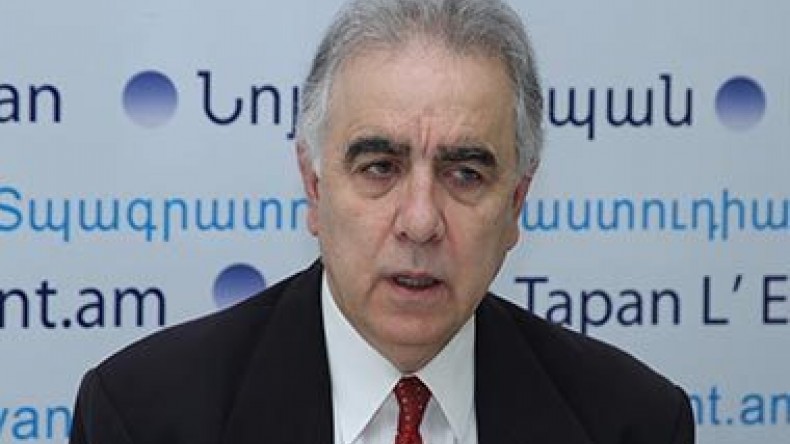
Japan and Turkey: On ‘Comfort Women’ and Genocide
By Harut Sassounian
Publisher, The California Courier
The sleepy town of Glendale became the center of a major international controversy on July 9, when the City Council approved a memorial to ‘comfort women’ — a euphemism to describe up to 200,000 young females who were forced into sexual slavery by the Japanese army during its occupation of Korea and neighboring countries before and during World War II.
The City Council, after hearing conflicting testimonies from members of the local Japanese and Korean communities, approved with a 4 to 1 vote the installation of a monument in Glendale in honor of ‘comfort women.’ At the unveiling ceremony of the monument, council members Ara Najarian and Zareh Sinanyan expressed sympathy for the plight of “comfort women,’ as their own Armenian ancestors had suffered from mass atrocities in Turkey.
Concerned by the parallels drawn between the genocide of Armenians by Turkey during World War I and the Japanese military’s sexual enslavement of ‘comfort women’ during World War II, the Consulate of Japan in Los Angeles sought a meeting with the Armenian National Committee of America to present its government’s position on this issue.
During Deputy Consul General Masahiro Suga’s meeting with ANCA, it became evident that the Japanese government had been far more forthcoming regarding the crimes committed by the imperial Japanese army than the Turkish government was on the Armenian Genocide. Mr. Suga explained that Japan had recognized its responsibility for violating the rights of ‘comfort women’ by issuing an apology, and offering compensation to the victims.
Nevertheless, the ‘comfort women’ remain dissatisfied with Japan’s acts of “atonement,” accusing Japanese officials of making conflicting announcements on this issue. Most ‘comfort women’ have also rejected the offered financial compensation, claiming that it was partially provided by private sources and not the government of Japan. In 2007, the U.S. House of Representatives adopted a resolution in support of ‘comfort women,’ urging the Japanese government to “formally acknowledge, apologize, and accept historical responsibility in a clear and unequivocal manner for its Imperial Armed Forces’ coercion of young women into sexual slavery.”
To find out how Japan’s reaction to the issue of ‘comfort women’ differed from the Turkish government’s denialist stand on the Armenian Genocide, I interviewed Jun Niimi, the Consul General of Japan in Los Angeles. He fondly spoke about his “affinity” toward Armenians developed during his 1995-98 service at the Japanese Embassy in Tehran, and his subsequent visits to Armenia, while stationed at the Embassy of Japan in Moscow.
Regarding the Japanese government’s position on ‘comfort women,’ Mr. Niimi explained that Prime Minister Tomiichi Murayama issued a statement in 1995, expressing “deep remorse” and “heartfelt apology.” Japan also “provided atonement through the Asian Women’s Fund.”
Turning to the differences in the reaction of Turkey to the Armenian Genocide and Japan’s to the abuse of ‘comfort women,’ Consul General Niimi made three points:
“The government of Japan is well aware of the tragedy of the Armenian people at the beginning of last century. We would like to express our deepest condolences and sympathy to the victims. It is our strong belief that this kind of tragedy should never be repeated. The second point is regarding the position of the Turkish government. This is about another country’s position. Even though we are aware of that atrocity, yet, we are not in a position to grasp the details of precisely what happened a century ago in that area. So we cannot make a comment on the Turkish government’s position. But, I would like to repeat that we are aware of the tragedy and would like to express our sympathy and condolences. And the third point is that, regardless of the position of the Turkish government, the Japanese government’s position on the issue of ‘comfort women’ is that it expressed apology and remorse and made efforts to extend support to former ‘comfort women.’”
I informed the Consul General that Japan’s position on the Armenian Genocide is not much different from that of Turkey. I asked Mr. Niimi to relay to his country’s Foreign Ministry that Japan’s lack of acknowledgment of the Armenian Genocide reinforces the skepticism of those who question the Japanese government’s sincerity in dealing fairly with the issue of ‘comfort women.’
In response, the Consul General of Japan expressed his understanding that “the word tragedy doesn’t sound good to you, because it’s genocide.” He promised to convey to his government “the sentiments of the Armenian community” on this issue.
Newsfeed
Videos






























